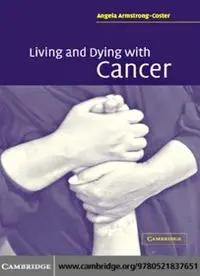
Living and Dying with Cancer PDF
Preview Living and Dying with Cancer
This page intentionally left blank Living and Dying with Cancer Living and Dying with Cancer is a powerful and moving account of the experiences of those affected by one of the most common causes of death in the Western world. Through a series of individual narratives based on extensive interviews carried out by the author, the book explores the impact that being diagnosed with cancer has on those with the disease and the people around them. It follows the different trajectories of the disease from the very first symptoms, through treatment to death and shows how the experience of the disease and even the way it develops is affected by the social context of the people involved, as well as their own physical and psychological characteristics. This book will be an invaluable resource not only for social scientists and health professionals but also for those coming to terms with the impact of cancer on their own lives. - is a Lecturer in the Division of Social Sciences, University of Southampton, with interests in palliative care, death and dying and narrative research. She is also a regular contributor to the media in these areas. Living and Dying with Cancer Angela Armstrong-Coster cambridge university press Cambridge, New York, Melbourne, Madrid, Cape Town, Singapore, São Paulo Cambridge University Press The Edinburgh Building, Cambridge cb2 2ru, UK Published in the United States of America by Cambridge University Press, New York www.cambridge.org Information on this title: www.cambridge.org/9780521837651 © Angela Armstrong-Coster 2004 This publication is in copyright. Subject to statutory exception and to the provision of relevant collective licensing agreements, no reproduction of any part may take place without the written permission of Cambridge University Press. First published in print format 2004 isbn-13 978-0-511-21081-5 eBook (EBL) isbn-10 0-511-21258-5 eBook (EBL) isbn-13 978-0-521-83765-1 hardback isbn-10 0-521-83765-0 hardback isbn-13 978-0-521-54667-6 paperback isbn-10 0-521-54667-2 paperback Cambridge University Press has no responsibility for the persistence or accuracy of urls for external or third-party internet websites referred to in this publication, and does not guarantee that any content on such websites is, or will remain, accurate or appropriate. This book is dedicated with love to my father, Ronnie Armstrong, who taught me so much and to all the individuals who participated in the research, many of whom you will meet in the pages of this book. Death is no enemy of life; it restores our sense of the value of living. Illness restores the sense of proportion that is lost when we take life for granted. To learn about value and proportion, we need to honor illness, and ultimately to honor death. Arthur W. Frank, At the Will of the Body (1991: 120) . . . my life counts; its termination, its being-no-more, my death, is no more a senseless, absurd, unjustifiable occurrence: not that sinking into the emptiness of non-existence it once was – that vanishing which changes nothing in the world. Through making myself for-the-other, I make myself for-myself, I pour meaning into my being-in-the world. I refuse the world the licence to disdain and dismiss my presence; I force the world to note, and to dread in advance my passing away, and to bewail it when it comes. [his italics] Zygmunt Bauman, Mortality, Immortality and Other Life Strategies (1992: 202) Contents List of tables page viii Preface: Opening the silence ix Acknowledgements xii Introduction 1 1 Mortality in modern culture 7 The principal respondents 14 Bereaved respondents 15 2 Stage One – Departure 16 Symptoms, consultations and diagnoses 16 Finding the symptoms 17 Consulting the professionals 28 Diagnosis 34 Chapter summary 48 3 Stage Two – Exploration 51 Tests and treatment 51 The tests 55 Treatment 65 Chapter summary 78 4 Stage Three – Anticipation 81 Remission and recurrence 81 Chapter summary 132 5 Stage Four – Destination 135 The deaths 135 Hospice case studies 155 Chapter summary 174 Last words 176 Bibliography 182 Index 187 vii Tables 1 The four stages common to those who are dying from cancer page 3 2 Characteristics common to the contemporary dying hero 5 3 Timeline for Louise’s life 21 viii
